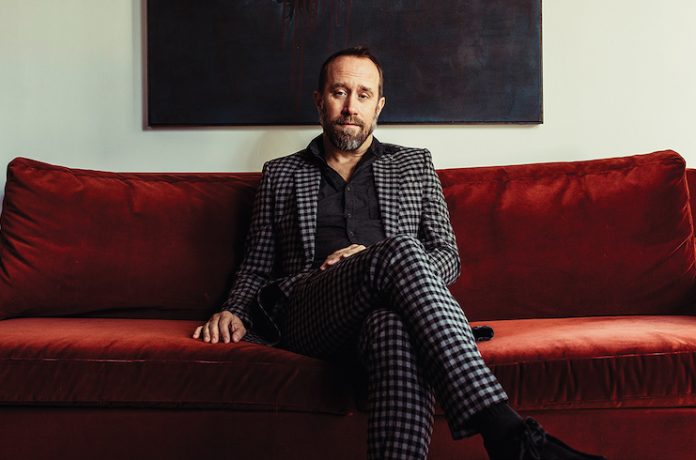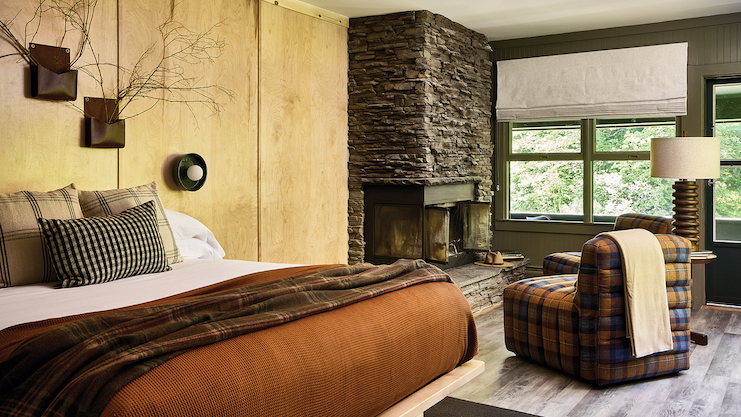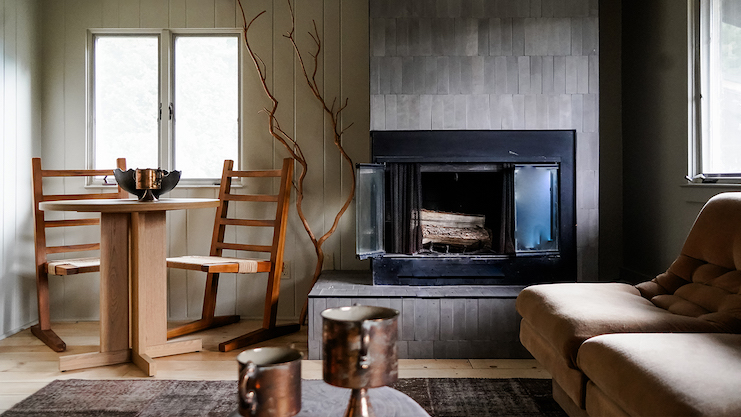
Lark Hotels founder Robert Blood wears many hats now. In addition to serving as president of the boutique hotel brand and management company he founded in 2012, he’s principal of the design firm Elder & Ash and partner at Lark Capital, which is an investment and development affiliate. In describing his unlikely journey from English major to hotelier, Blood said he himself is proof of the concept that the “right mindset” is the most important qualification for achieving success in hospitality. He said the company is now growing and thriving—in fact, it’s nearly doubled in size since 2020, when he was finally able to convince longtime friend and colleague Peter Twachtman to take over day-to-day operations as CEO and focus on what he does best and enjoys most—“creative vision, strategic growth, and brand elevation.”
Early Days
Blood traced what he has come to realize was an affinity for hospitality to the days when, as a student at Bates College, he was part of a student activities board that created entertainment experiences, and to his time as a ski instructor at Sugarloaf who imagined owning a popular bar and inn. He added that his father’s premature death helped shape his attitude toward life, and perhaps nudged him toward hospitality. “My mom and dad had talked about retiring when they were 55 and opening a bed-and-breakfast,” he said.
However, it wasn’t until he and his then-girlfriend, Leigh, who became his first wife, took a job on the island of Nantucket as innkeepers for Susan and Dale Hamilton that he actually experienced what it took to run such an enterprise, and, more importantly, learned how much he enjoyed it. “Even though we had no experience at all, they just handed us the keys and left us to run the place. We learned the business from the inside out, with the support, friendship, and mentorship of Dale and Susan,” Blood said. From that year-long experience, he decided how he wanted to live and work. “From the moment I stepped foot on Nantucket and became the innkeeper of the Sherburne Inn, I decided to live my life working at something I really enjoy, something that wasn’t just a job, but a lifestyle.”
A Hotel of His Own
In considering options for a hotel of his own, Blood was drawn to what became known as the boutique sector based on his experience at the Sherburne Inn: “People loved being there mostly for the immersive environment and the experience they were having.” However, as he quickly learned, investing in a boutique hotel was another matter entirely: “Fortunately, I didn’t go to Cornell Hotel School, so I didn’t know that it was agreed upon that making hotels under 100 keys profitable was impossible.”
Lucky for him, his mother disregarded the advice of well-meaning friends and fronted the down payment after reading the business plan he created with the help of Dale Hamilton, a Harvard Business School graduate who, with his Sherburne Inn, proved that a well-located small property could be economically viable. So, with a $350,000 loan from his mother (a 10-year note at 6 percent interest), an SBA loan, and conventional bank financing, he was able to purchase his first property, a nine-room inn in Kennebunkport, Maine, for $1.725 million in 2004.
Blood said this first property “was like a test lab for us. Leigh and I became experts at cost control and learned how to run a very tight business.” He said they also learned the value of investing in repositioning and design. “People really liked the independent spirit of our property because it felt very local. We found that by making smart renovation and design choices that we could really drive top-line revenue.”
Through trial and error and very hard work, they developed an operating principle that worked for them. “I wanted to elevate the experience in these small historic properties for a more modern traveler—we replaced the doilies and lace with modern conveniences and comforts alongside nods to New England charm and history.”
Their gamble paid off. Four years after opening the Captain Fairfield Inn, they were able to do a cash-out refinance, enabling him to pay his mother back in half the time.
Between the refinance of that property and the founding of Lark Hotels in 2012 there were other ventures, including The Veranda House and Chapman House on Nantucket, purchased with the Hamiltons, and The Attwater, in Newport, Rhode Island, purchased with his mother and sister. He also provided consulting services to hotels and resorts from 2007-2012.
From Ownership to Partnership
Much has changed in the years since Blood founded Lark Hotels, which is now what Blood described as “a management company and a brand” that does not own the hotels in its portfolio. However, Blood, who is president, does own 22 of those hotels with investors through Lark Capital, the affiliated investment and development division of Lark created in 2022. There has also been a full-service design studio open to everyone since he and his second wife, Megan Kennedy, launched Elder & Ash in 2017.
At this point, Lark’s portfolio of properties has grown to 53 hotels. In addition to Lark Hotels, it includes “sister brands” that were created in response to demand for special brands in other segments: Bluebird by Lark, AWOL, and Blind Tiger guesthouses. In addition, Lark Independent extends to other independent properties the benefits of its expanded infrastructure, including hands-on operational, tech, design, HR, and revenue support.
The Right Mindset
Speaking to LODGING from one of the “unique spots” he prizes, Block Island Beach House in New Shoreham, Rhode Island, Blood described the many ways working in the boutique sector has enabled him to “live the dream”: “Although I wouldn’t say I had a natural inclination toward hotels or restaurants from an early age, I did have an innate desire to create experiences. I also really loved architecture, and the idea of being a steward of historic buildings that play an important role in communities.” He also had what he described as “the right mindset”: “You have to be willing to work hard, try new things, and embrace what you’re doing. We’re performing tasks that can be done by almost anyone—we’re fluffing pillows, making sure the drinks are good and hospital corners tight. What makes us good at what we do is how we make people feel.”
What he feels most is grateful: “The beauty of my life is that I get to work with my two best friends—along with a whole team of incredible people—while creating amazing experiences for people.”
Mentors Matter: Giving Credit Where Credit is Due
Unlike those born into the industry, Lark Hotels founder Robert Blood considers himself lucky to have stumbled into hospitality. He made sure to mention those whose helped make a difference in his ability to realize a dream he didn’t know he had.
Of course, it starts at home, with his parents. He called his mother, who disregarded the advice of friends who discouraged her from investing in his first property, “my greatest advocate and biggest believer. My mom has shaped my vision in life; she is a huge proponent of the idea of working alongside people.” He also acknowledged the influence of his father, who died long before his son became a successful hotelier: “My father supported the idea that life was a journey that should be celebrated.”
He stressed that it was Nantucket innkeepers Dale and Susan Hamilton who most directly influenced his career. “I really credit both Dale and Susan with giving me the chops to do what I do, starting with hiring me in the first place. They also modeled what it took to succeed, helped with my business plan, and proved that there were in fact profits to be had in special small properties. They bought the Sherburne [Inn] for $600,000, and, following sound, simple, practical business principles—unlike the previous owners—sold it for $2.4. million. I learned a tremendous amount from both of them.”















